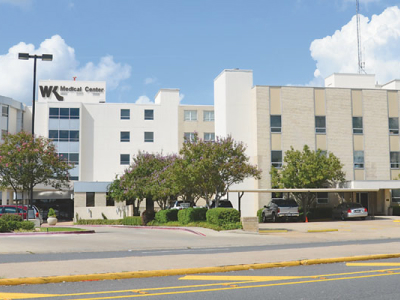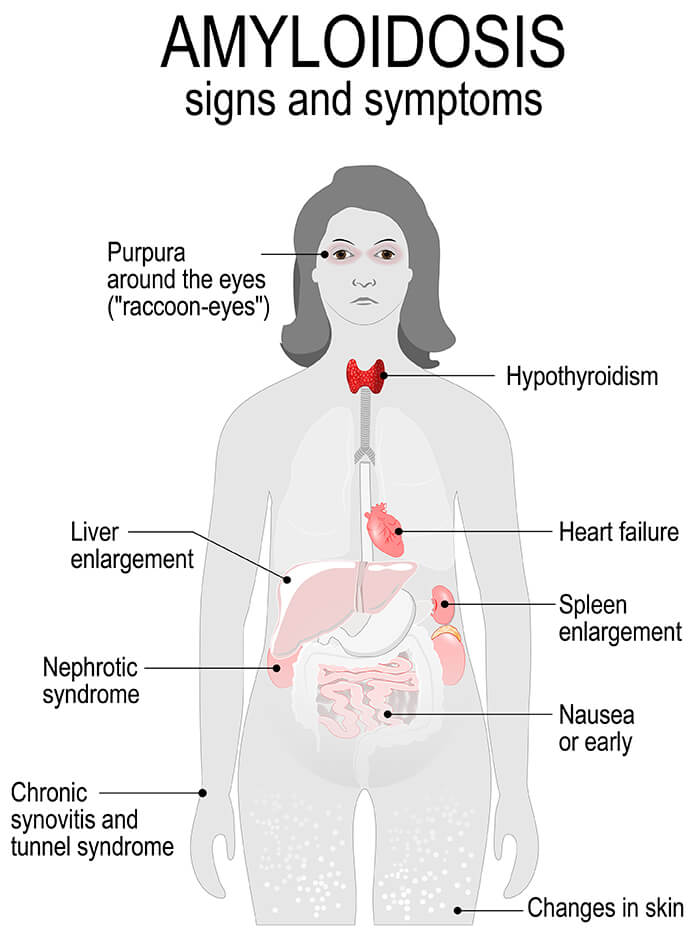Amyloidosis
What is Amyloidosis?
The human body constantly makes new proteins and removes old ones from the body. Amyloidosis is a rare disorder in which the process of creating new proteins or removing them is abnormal. It can occur if the body forms too many proteins, which is called AL amyloid or fails to remove them, referred to as TTR amyloid.
Overtime, these excess of protein deposits in organs such as heart, kidney and liver and impairs their ability to work properly.
What is ATTR (Transthyretin) Amyloidosis?
Transthyretin (TTR) is a normal protein made by your liver. In TTR amyloidosis, this protein unravels and deposits in your heart and/or nerves.
The two types of TTR amyloidosis are:
- Hereditary ATTR
This type is genetic and can be passed down from one generation to the next. This is the most common type of amyloidosis.
- Wild Type ATTR
This type is not genetic and cannot be passed down to your children. This form is less common and tends to deposit into your organs at a slower rate. This form usually presents at age 65 or greater.
The ATTR amyloid proteins usually deposit on these nerves:
- Wrists where they cause carpel tunnel syndrome. This causes your hands and arms to become numb.
- Spinal canal where they cause narrowing in your spinal canal. This can lead to leg weakness and/or numbness, tingling, and/or burning in your legs and feet.
Other symptoms may include eye floaters and lightheadedness when standing up.
Other symptoms may include eye floaters and lightheadedness when standing up.
What is AL (light chain) amyloidosis?
Light chains are antibodies made by plasma cells in the bone marrow. In AL amyloidosis, the misfolded antibodies deposit into the organs. The organs most commonly affected are heart and kidneys.
Symptoms
Symptoms affecting your arms and or legs are:
- Brittle fingernails and toenails (AL amyloid)
- Carpal tunnel syndrome
- Numbness, burning, tingling and/or weakness to hands or legs.
Symptoms affecting your head or neck are:
- Lightheadedness upon standing
- Eye floaters (TTR amyloid)
Symptoms affecting the heart and lungs are:
- Shortness of breath
- Palpitations
- Fatigue
- Leg swelling
Symptoms affecting your stomach and intestines are:
- Loss of appetite
- Bloating
- Diarrhea
- Constipation
Symptoms affecting your kidneys and bladder:
- Recurrent urinary tract infections (UTIs)
- Urinating less
Diagnosis
Since amyloidosis is caused by these proteins, it is important to know the exact protein that is causing your disease. Tests will be ordered to confirm that you have cardiac amyloidosis.
- PYP Scan: A dye is injected through an IV. This dye causes the ATTR proteins to “light up”.
- Cardiac Biopsy: If the PYP Scan is “borderline,” you may need a cardiac biopsy to confirm the diagnosis. During this procedure a thin sample of the heart muscle is taken to be reviewed.
- Genetic Testing: Once ATTR amyloidosis is confirmed, a genetic screening test will be done to help us see if the ATTR is Hereditary or Wild Type.
Other tests include:
- EKG to check your hearts rhythm
- Echocardiogram to check your heart’s function
- Lab tests: blood and urine
If your Amyloidosis is Hereditary, your family members have a higher risk of also having this condition. We will send you to a Genetic Counselor to learn more about your family members risks and their genetic testing.
Treatment
Your treatment will depend on the type of amyloid is discovered. Though the condition cannot be reversed, treatment may be able to slow the progression of the amyloid deposits and address damage to the heart. Other medications are currently being investigated for this condition.
Treatment may involve a combination of these approaches:
Medications
Medications approved by the FDA for treating patients with ATTR amyloidosis include:
- ATTR Stabilizers: This stabilizes the ATTR protein and keeps it from unraveling and forming amyloid deposits.
- ATTR Silencers: This helps the liver to decrease production of the TTR protein.
For Al amyloid, a hematologist will create a treatment plan for you. This treatment plan may include chemotherapy and steroids. These drugs work together to destroy the plasma cells that make the light chain protein. Your hematologist may also talk to you about a bone marrow transplant.
Treatment team
Your treatment team will vary depending on your symptoms. Your treatment team will likely include:
- Cardiologist; A doctor that specializes in the heart.
- Genetic Counselor: If your amyloid is hereditary, you will be referred, and the counselor will screen your family for the gene and help family members understand the risk of inheriting the disease.
- Hematologist: A doctor that specialized in blood problems
- Nephrologist: A doctor that specializes in the kidneys
- Neurologist: A doctor that specializes in the nerves.
Prognosis
Amyloidosis is a long-term disease. The severity depends on which organs are affected. Early diagnosis is the key to managing your disease before it becomes advanced.
Next Steps
For more information about Amyloidosis please consult with your doctor or call our Heart Failure Clinic at 318-465-3869.

Connect to a provider
Our Find a Doctor lets you search by specialty, procedure, condition or a provider’s name. Click below to get the care you need.

Subscribe to Our Healthy Hearts Newsletter
Tips to risk the reduce of heart disease and prevent, information on new therapies and treatments, heart healthy recipes and more.
















